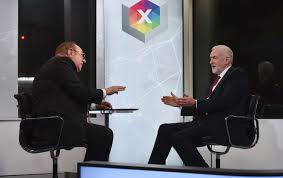
- Select a language for the TTS:
- UK English Female
- UK English Male
- US English Female
- US English Male
- Australian Female
- Australian Male
- Language selected: (auto detect) - EN
Play all audios:
Plop go 160,000 ballot papers through the letter boxes of Conservative Party members, as they get ready to decide who is to be their next Leader. Their mood is generally rather upbeat, all
things considered. The latest opinion poll for YouGov has the Conservatives up a couple of points . . . on 24 per cent. In normal times this would be regarded as appalling. That is a six
point lead over Labour – who have managed their worst ever rating of 18 per cent. But it is only a one point leader over the Brexit Party. Still, the Conservatives can see a “path” (albeit
perhaps a bumpy one) to us leaving the EU on October 31 and thus being able to guzzle up a big share of the Brexit Party vote. Given all the delays and broken promises, a lot of Brexiteers
will believe it when they see it. They are withholding judgement and you can scarcely blame them. Some may already return to the Conservative fold in anticipation that Boris Johnson will
take charge and then deliver on his promises. Some. But in this cynical age not very many. The explanation I give to the tentative signs of the green shoots of Conservative recovery are
different. For the first time in a few years the Conservatives are finding the confidence to state their case. In the General Election campaign of 2017, for instance, there was a failure by
the Conservatives to give positive reasons to vote for them. Certainly, we had warnings against the extremism of the Labour Party under Jeremy Corbyn. There was no shortage of material for
that message. Yet when it came to what the Conservatives stood for, it was all a bit vague. The “retail offers” to the voters were embarrassingly meagre. Nothing much resonated with a
coherent Conservative philosophy — as a sense of the direction the country is being taken in. We ended up trying to build a personality cult around Theresa May — yet she displayed a
deadening lack of personality, just repeating phrases such as: “Strong and stable” or “Brexit means Brexit”. Or, most ominously: “Nothing has changed.” It hasn’t helped that Philip Hammond
has been such a misery guts as Chancellor of the Exchequer. Rather than offering a “balanced ticket” to May, he had added to the gloom and technocratic tedium. On that great issue of the
day, Brexit, the message has been one of sullen defeatism. It is quite right to challenge broadcasters pushing their own agenda. For some weeks earlier this year Project Fear stories
dominated the airwaves. But rather than rebut them, ministers were often willing to play along. The malaise went even wider than that, though. With so many of the social and economic
challenges of our time, the response of May’s Conservatives has been to placate the demands of the Left by some tinkering or concessions towards their policy demands. We’ve seen appeasement
over “identity politics”, a shift towards the “nanny state”, the notion that economic equality should be an objective rather than economic expansion. The efficacy of further state control is
casually conceded. The “end of austerity” was briefed as meaning a chance for increased Government spending, rather than a lower tax on households. And the Conservatives even conceded
Labour’s claim that the solution to the housing shortage was for the state to build more homes. At last, the voters are starting to hear Conservatives speak up for their principles. True it
has been a bit “cacophonous” as Boris Johnson put it. The media coverage has not been particularly sympathetic. There have been the distractions — such as tapes of domestic rows being passed
to the _Guardian_. Yet through all this, some strong, optimistic and self confident messages have come through. Even for those who only catch the occasional bulletin, the break with the
May/Hammond era has been hard to miss. There has been a resolve that Brexit will happen — in genuine form rather than the synthetic version of May’s “Withdrawal Agreement”. We have moved on
from the craven notion that we require the EU to give us permission to leave. Instead of the whole procedure being thought of in terms of damage control, some consideration is being given to
the opportunities the big wide world has to offer. At his launch, Boris Johnson declared: “I’m championing the wealth creating sector. Extolling the merits of the free market capitalism
because that is the way to support the poorest and neediest in our society. I am absolutely determined to make that the core of my campaign.” Backing tax cuts for both rich and poor, he
says: “As the great Tunisian scholar and sage, Ibn Khaldun, pointed out, as early as the 14th century, there are plenty of taxes that you can cut which will actually increase your revenues
and there are ways of making sure that you can stimulate growth, you stimulate enterprise and you get more in.” In fairness, Jeremy Hunt has given a similar pitch. He proposes cutting
Corporation Tax to the Irish level of 12.5 per cent, arguing that it would boost economic growth. It is a difficult argument for the Left to refute. Rather than embarrassment about being
rich, Hunt has shown pride in having been an entrepreneur. Both the leadership contenders agree: success is to be celebrated and rewarded, not envied and stamped on. Policies matter, but so
does tone. The Tory leadership election has give the Conservatives the chance to reinvent themselves as optimists. The grinding, drab fatalism of the May years is ending. Free enterprise was
largely repudiated by May, but will again be vigorously defended by her successor. Self belief is returning to the Conservatives and they hope it will spread to the country as a whole. It
doesn’t mean they will win the battle of ideas. But at least they are no longer waving the white flag.







